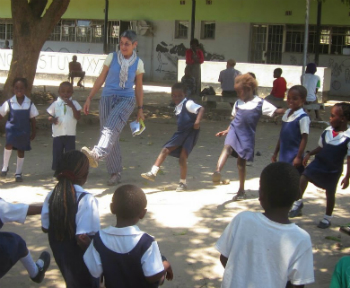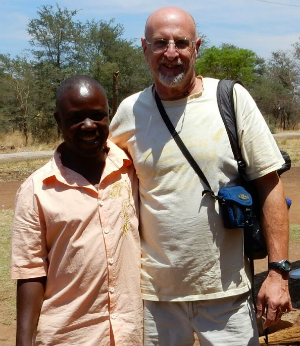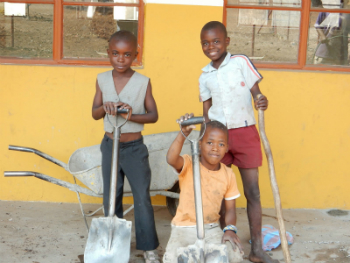
Describe your day to day activities as a volunteer.
Susan: Our project sites were an hour and a half's walk or 20+ minutes by two taxis, from our volunteer house, and could be longer depending on how long it took us to get a ride. Given the heat of the morning, and our need to be on time, we contracted with a local taxi driver to pick us up and drive us to/from our project every day. This saved us time and money in the long run, plus we got to know our local driver in a much more meaningful, personal way.
Each night, I referenced the lesson plan (from the workbook) and decided what and how I would teach the hour lesson(s) ahead of me. I often had to improvise, given a lack of resources, relying on what I could draw on the chalk board. I used flash cards and other resources I brought from the USA to enhance my lesson. With younger pre-school children, I relied on rhymes and nursery songs which were a big hit.
Although, not a teacher by career, each day the 2nd level teacher observed (and spoke in the local language when necessary to explain or get the kids under control) but enjoyed letting me take the lead role and teach her classes in English, using a few resources I brought with me (flash cards I made for colors, shapes etc, deck of cards for numbers, drawing on board). When the 2nd level kids had language or religion, I would go to help the 7th level with English or work with the pre school children. The school was very appreciative and made every effort to keep me busy and occupied.
Aaron: Day to day consisted of meeting up with the local project supervisor, Bilton, and seeing what needed to be done. For a "light construction/community development" IVHQ volunteer, this included leveling the front yard of a new school, finishing up the cement floors, planting around the school and playground, helping clean the chicken coop, working in the fields to prepare for planting and anything else that came up.

Ten years from now, what's the one thing you think you'll remember from the trip?
Susan: How much the kids engaged me, the teachers accepted me and how I felt like I worked there and contributed for far longer than the 2 weeks I was volunteering.
Aaron: The dignity and tenacity of the people. I will remember how much of a connection I made, that in the end, we decided to fund a post assignment project to patch and paint the homes in the community where I worked.
Has your worldview changed as a result of your trip?
Susan: No, however, I realized how important it is to experience vs think you know what you will find in a new country. Africa, Zambia was totally different than any expectations I had. What has changed, is my view of myself and my husband, in that as early retirees who love to travel, I feel our "giving back" gives us a great feeling and adds to our enjoyment of travel. By volunteering on a project, we get a real sense though small slice of the local community, culture and an opportunity to catch our breath, while doing good and hopefully, giving those we work with a good sense about themselves and us as Westerners.
Aaron: No, after traveling in over 65 countries, it just reinforced what a big world we live in, full of wonderful diversity and different cultures.
What was the most interesting cultural difference you encountered?
Susan: The simple love of the people for their country and their seemingly making a good life filled with happiness, despite so little compared to the volunteers and the countries we come from.
Aaron: The locals eating "shima" (steamed maize) 3 times a day, and preferring it over the more "western" food they cooked for us.

Where would you most like to travel to next?
Susan & Aaron: We are heading to Sri Lanka, Philippines and Indonesia next month, once again volunteering with IVHQ two weeks, in both Sri Lanka and Bali. Can't wait.